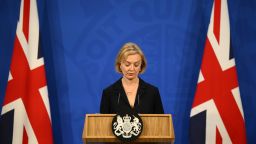A new leadership contest will take place within a week, Liz Truss said in her resignation speech.
This will be the fifth Conservative prime minister in just over six years – and the third within this parliamentary term.
But who might the next leader be? Here are the main runners and riders.
Rishi Sunak
Sunak has proved to be something of a prophet of the government’s demise, as many of the predictions he made during this summer’s leadership about Truss’s economic plan came to pass.
The former Chancellor of the Exchequer (finance minister) warned that Truss’s unfunded tax cuts would lead to a run on sterling, a panic in the bond market and concern from the International Monetary Fund. Perhaps even he would have been surprised by the pace with which he was proved right.
Sunak has experience of economic crisis-fighting, having guided the UK through the Covid-19 pandemic. He is also popular among MPs, having secured more votes within Parliament than Truss before the choice between the final candidates was put to the members, and only losing narrowly in the final vote.
The trust he has among MPs – and the vindication his predictions have gained – may make him the most likely next set of hands to steer the ship.
Penny Mordaunt
The Leader of the House of Commons may have had a dress rehearsal for being prime minister this week, after stepping in for an absent Liz Truss at a debate.
“The prime minister is not under a desk,” Mordaunt confirmed Tuesday – in a performance that seemed as much about pitching herself as it did about helping the PM.
Mordaunt came third in the last leadership election, narrowly missing out on being put before the members – among whom she was expected to do well, in part due to her military credentials. Mordaunt is a reservist of the Royal Navy.
Like Sunak, she is from the more moderate wing of the party. There was even talk among MPs of the two forming a “dream team” ticket, although this is yet to materialize – and it is unclear if Sunak would settle for being chancellor again.
Grant Shapps
It is a sign of the disorder of the last days of Truss’s government that she elevated Grant Shapps to home secretary – despite not offering him a ministerial role of any sort when she first took office.
Shapps served as transport secretary under Boris Johnson. He put himself forward to succeed him in the previous leadership election – only to withdraw from the race three days later, after failing to secure the requisite 20 MPs votes to proceed to the next round.
Kemi Badenoch
Badenoch came fourth in this summer’s leadership election – but was consistently rated by pollsters as a favorite among Conservative grassroots.
One of the younger MPs in the running, Badenoch quickly won the endorsement of long-serving Tory grandee Michael Gove, who praised her as the “outstanding talent” in the party.
Badenoch is from the right of the Tory party – and in her previous leadership bid suggested that the government’s climate targets might prove too costly.
Boris Johnson
Only a few months ago, Johnson commanded a comfortable majority in Parliament and even claimed he was even considering his third term – to widespread derision. Despite being beset by a seemingly endless string of scandals, Labour still lagged behind in the polls – and Johnson did not have an obvious competitor in the party.
In his final speech as Prime Minister outside 10 Downing Street, Johnson made one of his characteristic allusions to ancient history. He said he would “return to his plough” like the Roman statesman Cincinnatus – suggesting a quieter life on the backbenches.
But that’s not how Cincinnatus saw out his days. He was called back from his plough to return to Rome for a second term – this time as a dictator.
The memories of “Partygate,” the prolonged scandal that eventually resulted in his downfall, may prove too fresh for MPs to call Johnson back yet.
But, as the Tory party faces electoral oblivion, the man who delivered an 80-seat majority in 2019 may prove a tempting option for many MPs.
Other names in the hat
Suella Braverman’s resignation as home secretary on Wednesday night may have been a precursor to a possible leadership bid. The former attorney-general has not run before – but with her hard-line stance on immigration, might look set to drag the party further to the right.
Tom Tugendhat emerged as a surprise favorite among Tory members and the wider public, despite only coming fifth in the last leadership election. Having not served as a cabinet member before that contest, Tugendhat distanced himself from the moral mess of Johnson’s government and promised a “clean start” for Britain. After serving in Iraq and Afghanistan, Tugendhat was made security minister by Truss.
Ben Wallace, defense secretary and another ex-military man, was tipped to succeed Johnson in the last leadership contest – polling extremely well among Conservative members. However, he never ran in that election, and it is unclear if his position will have changed since then.





























